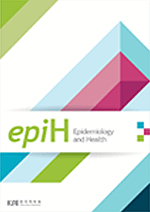A decision tree model for traffic accident prediction among food delivery riders
- 한국역학회
- Epidemiology and Health
- 46
-
2024.011 - 11 (11 pages)
-
DOI : 10.4178/epih.e2024095
- 0

OBJECTIVES: Food delivery riders (FDRs) play a crucial role in the food delivery industry but face considerable challenges, including a rising number of traffic accidents. This study aimed to examine the incidence of traffic accidents and develop a decision tree model to predict the likelihood of traffic accidents among FDRs. METHODS: A cross-sectional study was conducted with 257 FDRs in Chiang Mai and Lampang Province, Thailand. Participants were interviewed using questionnaires and provided self-reports of accidents over the previous 6 months. Univariable logistic regression was used to identify factors influencing traffic accidents. Subsequently, a decision tree model was developed to predict traffic accidents using a training and validation dataset split in a 70:30 ratio. RESULTS: The results indicated that 45.1% of FDRs had been involved in a traffic accident. The decision tree model identified several significant predictors of traffic accidents, including delivering food in the rain, job stress, fatigue, inadequate sleep, and the use of a modified motorcycle, achieving a prediction accuracy of 66.5%. CONCLUSIONS: Based on this model, we recommend several measures to minimize accidents among FDRs: ensuring adequate sleep, implementing work-rest schedules to mitigate fatigue, managing job-related stress effectively, inspecting motorcycle conditions before use, and exercising increased caution when delivering food during rainy conditions.
INTRODUCTION
MATERIALS AND METHODS
RESULTS
DISCUSSION
NOTES
REFERENCES
(0)
(0)